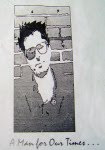Désenchanté

Water beads on the shiny hood of the old Citroen as the girl's driver noses it out into the rain. A groundsman closes the tall door of the stable behind as you look over your shoulder through the sloping rear window.
The girl's knee presses against your thigh and she pulls at your hand, putting it on her own thigh.
It feels like someone else's hand on someone else's rich beautiful girlfriend's perfect thigh.
How did I get here? you ask yourself, as though a plot device in a cheap melodrama.
But no flashback rolls out... just the dull, internalized throb of what felt like 20 years of smoky northern european discos. Even when his girlfriend made him stay by the side of the lake at Interlachen for a week, he felt the throb, like a factory worker who can't lose the pound and grind of the machines, no matter how far away he goes. Or how drunk he gets.
He never used to drink that much. What happened there? he asked again, the words hanging like a bad digital reverb in the empty soundstage he imagined his mind to be.
But there was no threshold... no tipping point. Now, the alcohol was simply the sea that every night floated on. Every night a carefully measured voyage from wary alertness as he reached the club and set up to a deadened weariness as he got home at dawn... a slogging, dots-in-front-of-the-eyes almost deadness that was somehow both comforting and terrifying in its indistinguishable familiarity.
Of course, I didn't necessarily have the jaded turntablist/DJ above in mind when I wrote this song. In fact, at a time when I'd been writing a lot of blues, I found myself thumping out the familiar 1-4-5 of a 12 bar blues and heard myself sing: "I'm sick of the blues..."
But I thought to myself... yeah, the world's never heard a song about a guy or gal who's been down so long, down's got 'em down. How can I subvert this?
So I made the song a lament not about depression, loneliness, and heartbreak -- but rather about literally being bored with blues music. Which I was. (In a loving way, mind you.)
But I was also bored with a lot of music. The catalog of styles reeled off in the first verse of this song is suggestive of what I was listening to back in '94 (except for Madonna and Bono, of whom, indeed, I have always been sick).
By the time I got to the second verse, I realized that, while I could just spend three verses listing off music styles, maybe I needed some kind of development. So I started listing off trendy cuisines. And the last verse, a brief catalog of putatively desirable destinations, directly suggested the title I ultimately chose and hinted at the vignette above, variants of which I used in the past to promote the 'studio' version.
The studio version (and the studio, as I've noted before was some cheap gear hooked up to my computer, in mid 1999) was an instrumental -- or more properly, a dub. I did cut vocals and they did suck.
So I did some serious dub deconstruction and reconstruction. (I remember when we used to have to do dub mixes in realtime... imagine... jumping around, bumping faders back and forth, wiggling Echoplex levers, smacking guitar amp reverbs... how undignified it all was. Too much work.)
download [1.9 mb]
play [broadband]
AYoS radio [broadband]
dub version (1999)
I'm sick of the blues
I'm sick of reggae too
I'm sick of rock and country
rap and techno too
I'm sick of Madonna and Bono
of course I always was
m sick of world music
ambient trance and dub
I am sick to death of everything
I always loved to do
I'm sick to death everything
but most of all of you
I'm fed up with cuisine nouvelle
I'm cuttin' off Cajun too
I'm bored with bouillabaisse
with Thai and Greek I'm through
I wish I had a dollar
for every overpriced Bordeaux
I wish I had a dime for every time
you blew my roll
I am sick to death of everything
I always loved to do
I'm sick to death everything
but most of all of you
I'm désenchanté with
Cannes and St Tropez
I cannot regain
that simpaticismo
I felt in Spain
I can't explain
this ennui borders on pain
but all around the world
everything's about the same
I'm sick to death of everything
I ever loved to do
I'm sick to death everything
but most of all of you
1/19/94
(C)1994, TK Major










